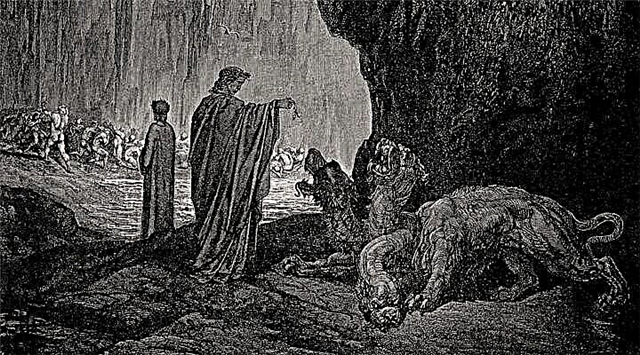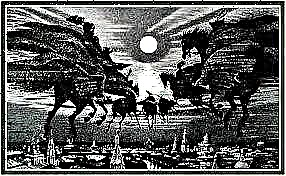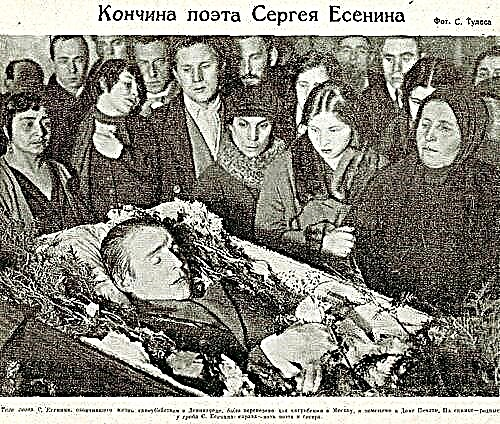The text of the first adventurous (or rogue) novel known in world literature has survived only fragmentarily: fragments of the 15th, 16th and presumably 14th chapters. There is no beginning, there is no end, and in all, apparently, there were 20 chapters ...
The main character (narration is being carried out on his behalf) is the unbalanced young man Enkolpiy who has grown rhetoric in rhetoric, clearly not a stupid, but, alas, faulty person. He is hiding, fleeing punishment for robbery, murder and, most importantly, for sexual sacrilege, which incurred the wrath of Priapus on him - a very peculiar ancient Greek god of fertility. (By the time of the novel’s cult, the cult of this god had flourished in Rome. Phallic motifs were obligatory in Priapus’s images: many of his sculptures were preserved)
Ancolpius with his similar parasite friends Aschilt, Githon and Agamemnon arrived in one of the Hellenic colonies in Campania (a region of ancient Italy). Visiting the rich Roman rider of Lycurgus, they all "intertwined in pairs." At the same time, in honor not only normal (from our point of view), but also purely male love. Then Enkolpiy and Askilt (until recently, former "brothers") periodically change their sympathies and love situations. Asquilt is fond of the cute boy Guiton, and Encolpius strikes after the beauty Tryphan ...
Soon, the action of the novel is transferred to the estate of the shipowner Leah. And - new love interweaving, in which the pretty Dorida, the wife of Likh, also takes part. As a result, Enkolpius and Guiton have to urgently flee from the estate.
On the way, a dashing rhetoric lover gets on a ship, stranded, and manages to steal an expensive mantle from the statue of Isis and the helmsman’s money there. Then he returns to the estate to Lycurgus.
... Bacchanalia of Priapus fans - wild “pranks” of Priapny harlots ... After many adventures, Enkolpiy, Guiton, Askilt and Agamemnon go to a feast in the house of Trimalchion, a wealthy freedman, a dense ignoramus who imagines himself to be very educated. He vigorously breaks into the "high society".
Conversations at a feast. Tales of gladiators. The owner informs the guests importantly: “Now I have two libraries. One is Greek, the other is Latin. ” But then it turns out that in his head the most monstrous way messed up the famous heroes and plots of Hellenic myths and Homer's epic. The self-confident arrogance of an illiterate master is limitless. He graciously addresses the guests and at the same time, yesterday’s slave himself, is unjustifiably cruel to servants. However, Trimalchion is outgoing ...
On a huge silver platter, servants bring in a whole boar, from which blackbirds suddenly fly out. They were immediately intercepted by the birders and distributed to the guests. An even grander pig is stuffed with grilled sausages. It immediately turned out to be a dish with cakes: “In the middle of it was Priap from dough, holding, as usual, a basket with apples, grapes and other fruits. We eagerly pounced on the fruits, but already a new fun intensified the fun. For of all the cakes, at the slightest pressure, saffron fountains scored ... "
Then the three boys bring in the images of the three Laras (guardian gods of the house and family). Trimalchion reports: their names are the Prospector, the Lucky, and the Baiter. To amuse those present, Nikeroth, a friend of Trimalchion, tells the story of a werewolf soldier, and Trimalchion himself tells of a witch who kidnapped a dead boy from the grave and replaced the body with fofan (a straw scarecrow).
Meanwhile, the second meal begins: blackbirds stuffed with nuts and raisins. Then a huge fat goose is served, surrounded by all kinds of fish and birds. But it turned out that the most skilled cook (named Daedalus!) Made all this from ... pork.
"Then it began that it was simply embarrassing to tell: according to some unheard of custom, curly-haired boys brought perfume in silver bottles and rubbed the legs of the reclining ones, after having entangled the legs, from the knee to the very heel, with flower garlands."
The cook, as a reward for his art, was allowed to lie at the table with the guests for a while. At the same time, the servants, serving the next dishes, always sang something, regardless of the presence of voice and hearing. Dancers, acrobats and magicians also entertained guests almost continuously.
The moved Trimalchion decided to announce ... his will, a detailed description of the future magnificent tombstone and the inscription on it (his own composition, of course) with a detailed listing of his ranks and merits. Touched even more by this, he could not resist making a corresponding speech: “Friends! And slaves are people: they are fed milk with one of us. And it’s not their fault that their fate is bitter. However, by my grace, soon they will drink free water. I will release them all in my testament. All this I now declare so that the servants will love me as much as they will when I die. ”
The adventures of Encolpia continue. Once he wanders into the Pinakothek (art gallery), where he admires the paintings of the famous Hellenic painters Apelles, Zeusxid and others. Immediately he meets the old poet Eumolpus and does not part with him until the very end of the story (or rather, to the end we know).
Eumolpus speaks poetry almost continuously, for which he has repeatedly been stoned. Although his poems were not at all bad. And sometimes they are very good. The prosaic canvas of the Satyricon is often interrupted by poetic inserts (The Poem of the Civil War, etc.). Petronius was not only a very observant and talented prose writer and poet, but also an excellent imitator-parodist: he masterfully imitated the literary style of his contemporaries and famous predecessors.
... Eumolpus and Encolpius talk about art. Educated people have something to talk about. Meanwhile, handsome Guiton is returning from Asquilt confessing to his former "brother" Encolpius. He explains his betrayal by his fear of Asquilt: "For he possessed weapons of such magnitude that the man himself seemed only an appendage to this building." A new twist of fate: all three are on the ship Likh. But not all of them here are equally welcome. However, the old poet is rebuilding the world. Then he entertains his companions with the “Tale of the inconsolable widow.”
A certain matron from Ephesus was distinguished by great modesty and marital fidelity. And when her husband died, she followed him into the funerary dungeon and intended to starve herself to death there. The widow does not succumb to the entreaties of relatives and friends. Only a faithful servant brightens up her loneliness in the crypt and just as stubbornly starves. The fifth day of mourning self-torture has passed ...
“... At this time, the ruler of that area ordered not far from the dungeon, in which the widow wept over a fresh corpse, to crucify several robbers. And so that someone would not pull off the robber bodies, wanting to put them to burial, they would guard one soldier near the crosses. At nightfall he noticed that a rather bright light was pouring from somewhere among the tombstones, he heard moans of the unhappy widow and out of curiosity inherent the whole human race, wanted to know who it is and what is being done there. He immediately went down to the crypt and, seeing there a woman of remarkable beauty, just as before a miracle, as if meeting face-to-face with the shadows of the underworld, stood for some time in embarrassment. Then, when he finally saw the dead body lying in front of him, when he examined her tears and her face scratched with nails, he, of course, realized that this was only a woman who, after the death of her husband, could not find rest from grief. Then he brought his humble dinner into the crypt and began to convince the weeping beauty so that she would not be wasted for nothing and would not tear her chest with useless sobs. ”
After some time, a faithful servant joins the persuasion of the soldier. Both convince the widow that it is too early for her to rush to the other world. Not immediately, but the sad Ephesian beauty nevertheless begins to succumb to their exhortations. First, exhausted by long fasting, she is seduced by food and drink. And after some time, the soldier manages to win the heart of a beautiful widow.
“They spent in mutual embrace not only this night on which they celebrated their wedding, but the same thing happened the next, and even the third day. And the doors to the dungeon, in case one of the relatives and acquaintances came to the grave, of course, were locked, so that it seemed as if this most chaste of the wives had died over the body of her husband. ”
Meanwhile, the relatives of one of the crucified, taking advantage of the lack of protection, removed from the cross and buried his body. And when the guard in love discovered this and, trembling from fear of impending punishment, told of the loss of a widow, she decided: "I prefer to hang the dead than to destroy the living." According to this, she gave advice to pull her husband out of the tomb and nail him to the empty cross. The soldier immediately took advantage of the brilliant thought of a sensible woman. And the next day, all passers-by were perplexed at how the dead climbed onto the cross.
A storm rises to the sea. In the abyss Likh perishes. The rest continue to rush along the waves. Moreover, Eumolpus does not stop his poetic recitation in this critical situation. But in the end, the unfortunate escape and spend a hectic night in a fishing hut.
And soon they all fall into Croton - one of the oldest Greek colonial cities on the southern coast of the Apennine Peninsula. This, incidentally, is the only geographical point specifically indicated in the accessible text of the novel.
To live comfortably and carefree (they’re so used to) in a new city, adventure friends decide: Evmolp will pass himself off as a very wealthy person who is wondering who would bequeath all his innumerable wealth. No sooner said than done. This makes it possible for cheerful friends to live peacefully, using the citizens not only a warm welcome, but also unlimited credit. For many Crotonians counted on a share in the will of Eumolpus and vied with each other to gain his favor.
And again a series of love affairs follows, not so much adventure as the misadventures of Enkolpiya. All his troubles are connected with the already mentioned anger of Priapus.
But the Crotonians finally saw their light, and there was no limit to their just anger. Citizens are energetically preparing reprisals against the cunning. The enkolpiya with Guiton manages to escape from the city, leaving Eumolpus there.
The inhabitants of Crotona act with the old poet according to their ancient custom. When some kind of illness was rampant in the city, one of the compatriots was supported and fed by citizens during the year in the best way at the expense of the community. And then they sacrificed: this "scapegoat" was thrown off a high cliff. This is exactly what the Crotonians did with Eumolpus.











